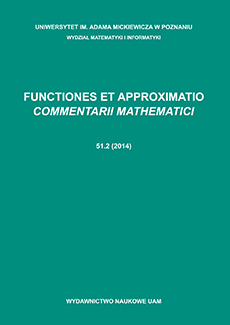Abstract
Motivated by Newman's phenomenon for the Thue-Morse sequence $(-1)^{s(n)}$, where $s(n)$ is the sum of the binary digits of $n$, we investigate a similar problem for prime numbers. More specifically, for an integer $k\ge 2$, we explore the signs of $ S_k(x)=\sum_{p \le x} (-1)^{s_k(p)}$, where $s_k(n)$ is the sum of the last $k$ binary digits of $n$, and $p$ runs over the primes. We prove that $S_k(x)$ changes signs for infinitely many integers $x$, assuming that all Dirichlet $L$-functions attached to primitive characters modulo $2^k$ do not vanish on $(0,1)$. Our result is unconditional for $k\leq 18$. Furthermore, under stronger assumptions on the zeros of Dirichlet $L$-functions, we show that for $k\geq 4$, the sets $\{x> 2: S_k(x)>0\}$ and $\{x> 2: S_k(x)<0\}$ both have logarithmic density $1/2$.
Citation
Youness Lamzouri. Bruno Martin. "On the race between primes with an odd versus an even sum of the last $k$ binary digits." Funct. Approx. Comment. Math. 61 (1) 7 - 25, September 2019. https://doi.org/10.7169/facm/1687
Information





